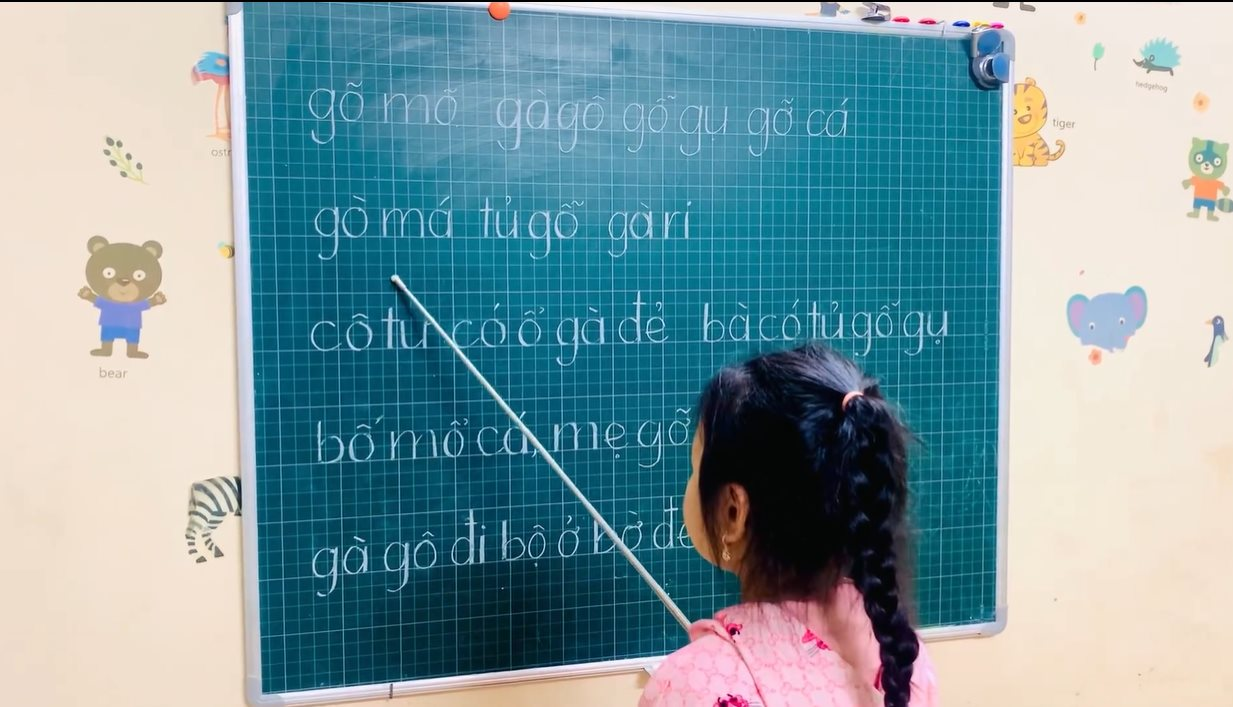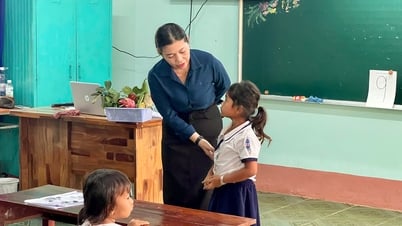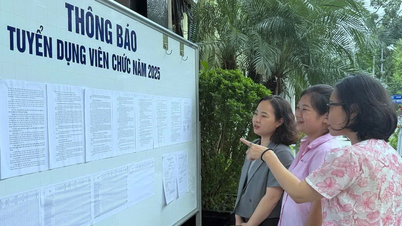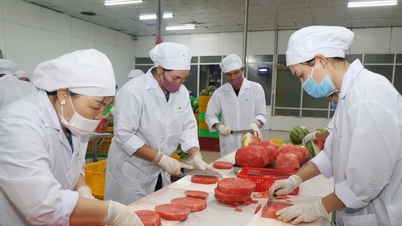
Many types of preschool learning
Having her first daughter born in 2018, Ms. Duong Thi Lan Anh (Hoang Mai district, Hanoi ) said that since September last year, many mothers in her child's preschool class have formed their own group, inviting teachers to teach "pre-primary school" or whispering to each other about famous classes around the school area.
“At that time, I thought it was still too early to let my child attend pre-primary school because I had discussed with some teachers about the curriculum, which mainly focused on practicing handwriting and math. My child had not yet learned the alphabet and was still weak at holding a coloring pen, so I did not let him study. But recently, I saw many mothers in the class showing off their children reading stories and doing addition and subtraction within 20, which made me worried, so I decided to stop the dance class to focus full-time on my child's pre-primary school, 4 evenings a week,” Lan Anh shared.
Also choosing the accelerated pre-primary school option, Ms. Vuong Ngo Lan (Thanh Xuan Bac collective housing area, Hanoi) said that it took a lot of fighting for her husband to give in to enrolling her child in a pre-primary school class opened by a teacher near their house. “My husband opposed the idea of studying first, saying that it would be okay to let the child enjoy their childhood and then start primary school. Only when he saw that the two children the same age as my child on the same floor were reading fluently and had a proper first grade manner did he finally give in. Hopefully, after 2.5 months of continuous summer study like this, the child will catch up with his friends so that when he enters first grade he won’t be too bewildered,” this parent expressed.
In fact, pre-primary classes today are very diverse with many different forms. For example, 1-1 learning, small group learning of 3-5 students or large group learning of 10 students... organized by the teacher or parents together to form groups and invite teachers to teach, organized by centers or schools. The form of learning is also diverse, from 1-1.5 hours/session to full-day boarding, full-week from Monday to Friday like going to an official primary school. Some parents, because they send their children back to the countryside, cannot pick them up or go to pre-primary classes taught by famous teachers, choose online classes for their children.
The cost of an online pre-primary course organized by a company is 720,000 VND for 365 days. It is emphasized that after completing the course, children will achieve both knowledge and skills requirements such as recognizing the alphabet system; numbers; calculating within 10; knowing how to write correctly; being able to combine and name simple sounds. At the same time, developing some necessary skills to be able to attend grade 1: expressing what they want to say; correctly naming objects and phenomena; knowing how to compare and use comparative words in specific cases; being confident and developing thinking.
According to the reporter's records, the current price of a pre-primary school lesson ranges from 80,000 - 150,000 VND for about 1 hour depending on the number of children and the brand of the teacher. In addition, many children also attend separate classes on handwriting, math, English... with equivalent tuition fees. Calculating the cost for a summer of learning knowledge before entering grade 1 for children is 1 month of the parents' salary.
Consider the suitability
Many fancy advertisements about the benefits of pre-primary courses are introduced by centers and teachers to parents. In reality, when parents look for pre-primary classes for their children, they mainly rely on the experiences and sharing of parents with older children. With the mentality of "a hundred hearings are not as good as one seeing", most of the "expensive" pre-primary teachers have many years of teaching experience, and have been recommended to other parents after finishing their studies.
However, to help children read and write fluently before entering first grade as many parents wish, studying in class is not enough, but at home, parents and relatives must also take turns sitting and studying with their children. Many children's awareness is still young, their hands are still weak, but homework is pages of squared notebooks to practice writing every day, plus the task of practicing reading a poem or a short story as required by the teacher. Parents and students are so stressed that one parent shared on a pre-primary school forum on social networks that "whenever I talk about going to first grade, my child cries, saying that he only likes to go to kindergarten, to color, he doesn't like to write letters, it's difficult, his hands are tired...".
Explaining this, a teacher with many years of experience teaching primary school said that the pressure of parents wanting their children to read and write fluently in a short time, and at a time that is ahead of the age calculated by the education sector, has put pressure on teachers, so some pre-primary classes have been cramming, demanding too much from some students. The program that should have been taught in 9 months of classes from morning to afternoon is now wrapped up in a few months of extra classes, each session lasting about 1.5 hours or less, of course it has to be accelerated, causing overload!
Associate Professor, Dr. Tran Thanh Nam - Vice Principal of the University of Education, Hanoi National University, said that organizing pre-primary education with the purpose of teaching knowledge in advance is not suitable for the development of children. The reason is that before entering grade 1, if parents force their children to study, children will feel that studying is stressful and difficult. This creates a negative feeling for children, making them dislike studying, leading to poor academic results.
In terms of physical condition and cognition, 5-year-old children can recognize numbers and letters, but their hand movements are not yet strong enough to hold a pen and write fluently. If at this time, children are forced to hold a pen and write for a long time, it can have a negative impact on their physical development.
Previously, in 2023, in Directive No. 2325 on rectifying the situation of teaching before the first grade program, the Ministry of Education and Training (MOET) requested departments to direct the Departments of Education and Training, primary schools, and preschools to coordinate with local authorities to propagate so that parents and society are properly aware of the harmful effects of teaching before the first grade program, not allowing children to study before the first grade program; strictly prohibiting teachers from organizing or participating in teaching before the first grade program.
The Ministry of Education and Training affirms that teaching in advance of the first grade curriculum is unscientific, causing difficulties in organizing first grade teaching, because it will make children subjective, reduce their interest in learning when entering first grade; negatively affect the child's psychological development, especially when the teacher has poor pedagogical methods.
Many localities, including Ho Chi Minh City, require all kindergartens in the area not to teach the first grade program in advance in any form. However, according to Associate Professor, Dr. Nguyen Vo Ky Anh, Institute for Educational Research and Human Potential Development in Vietnam (IPD), the decision to let children study pre-primary school or not depends on the parents. It is impossible to prohibit or advise them not to study because everyone around them sends their children to school. How many parents are willing to let their children "lose out" compared to their friends? The desire for their children to study well and be successful is a legitimate wish of parents, so hoping that their children will study ahead and not be defeated at the starting line is a common thought of many parents, which is understandable.
“The problem here is that we need to analyze for parents to understand, what is the purpose of pre-primary education? Is pre-primary education just going to class to read, do math, practice writing or what else? What amount of learning is appropriate for each child? I think this needs to be researched and widely communicated to the whole society so that everyone understands and gradually changes their perception, especially when the new general education program aims to develop the capacity of each student, not to teach uniforms that require all children to develop equally” - Mr. Nguyen Vo Ky Anh analyzed.
Thu Huong
Dr. Vu Thu Huong - education expert:
Focus on training life skills for children

The transition from preschool to primary school is extremely important for children. In preschool education, teachers take care of everything from eating, sleeping, physical activities, etc., so children at this age do not have enough capacity and awareness of responsibility for learning. Meanwhile, children entering grade 1 will receive a completely new educational environment, where they must be independent and follow the school's rules. Teachers are only responsible for teaching and checking lessons, ensuring that knowledge is conveyed correctly and sufficiently according to the training program.
Therefore, letting your child learn the first grade program before the preschool age is not advisable and is not suitable for the child's development process. Before entering first grade, you should promote life skills education so that your child can gradually adapt, acclimate and change his/her perception when preparing to transfer between two different educational environments.
Source: https://daidoanket.vn/sot-sang-tim-lop-tien-tieu-hoc-10283796.html



![[Photo] Binh Trieu 1 Bridge has been completed, raised by 1.1m, and will open to traffic at the end of November.](https://vphoto.vietnam.vn/thumb/1200x675/vietnam/resource/IMAGE/2025/10/2/a6549e2a3b5848a1ba76a1ded6141fae)







































































































Comment (0)